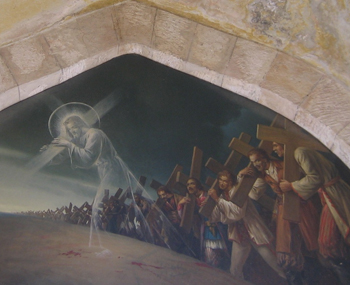For Sunday June 21, 2020
Lectionary Readings (Revised Common Lectionary, Year A)
Jeremiah 20:7-13
Psalm 69:7-18
Romans 6:1b-11
Matthew 10:24-39
What are you afraid of? What fills you with dread? What keeps you up at night, worrying? In these days of financial uncertainty, social isolation, cultural upheaval, and worldwide illness, I’m sure the answers to these questions are legion. We fear impoverishment. We fear Covid-19. We fear violence. We fear death.
As we wrestle with our fears, most of us turn to our faith to find fear’s opposite — peace. We “share the peace” with each other on Sunday mornings. “The peace of the Lord be always with you,” we say. “And also with you.” We profess our faith in Jesus, the Prince of Peace. We pray that God will grant us, “the peace that passes all understanding.” We assume — the vast majority of us, anyway — that ours is a religion of peace. A religion of peace-making, peace-loving, and peace-keeping.
So it’s jarring to open our Bibles this week to a text that says very little about peace. “Do you think that I have come to bring peace to the earth?” Jesus asks his disciples in our reading from the Gospel of Matthew. “I have not come to bring peace, but a sword.”
What are we to make of these words?
Indeed, what are we to make of this week’s lectionary as a whole, which explodes off the page with dire, provocative language that sounds anything but peaceful? The prophet Jeremiah describes God’s presence in his life as fire, “a burning fire shut up in my bones.” The Psalmist writes that his faith makes him an object of shame, gossip, insult, and reproach in his community. Paul reminds us that our commitment to Christ requires us not simply to be nice people, but to consider ourselves utterly “dead to sin.” And in our Gospel, Jesus speaks of exposed secrets, broken homes, heavy crosses, and lost lives.
In short, these texts invite us — or no, they compel us — to move beyond soft, saccharine Christianity, and wrestle with the hard, high costs of discipleship. Descriptive rather than prescriptive, they declare in honest, unflinching terms what will happen if we dare to take our faith seriously. What will happen in our families, our communities, our churches, and our world if we allow the “fire” of God’s word to burn through us. Bottom line? If "tender Jesus, meek and mild" is what we prefer, then this week’s lectionary is not for us. If an unrisky religion is what we feel entitled to practice, we’ve misunderstood Christianity. If neither you nor anyone within your sphere of influence has ever been provoked, disturbed, surprised, or challenged by your life of faith, then things are not okay in your life of faith.
 |
This week’s readings offer more riches than I can count, so I want to highlight just a few representative phrases, and consider what they say to us about fear, peace, and faith.
The Lord is with me like a dread warrior. This is the phrase Jeremiah uses to describe the presence of God in his life, and I’ll confess at the outset that it makes me wince. I grew up with “fire and brimstone” preaching, and I know what it’s like to envision God as harsh and punitive. So I tread carefully around images of a “scary” God, aware of their many pitfalls. And yet I wonder: are we, the 21st century Church, willing to “fear” God in ways that are right and necessary? Do we recognize that when it comes to evil, injustice, and oppression, God is in fact a “dread warrior?” Are we willing, for example, to allow this God to shatter the monolith that is white privilege and white supremacy in America? Are we open to God warring against our thoughtless consumerism, our casual lusts, our quiet hatreds, our unexamined idolatries? Can we allow God to battle the large-scale indifference to death and addiction to guns that daily turn our streets, schools, playgrounds, and shopping malls into bloody war zones? Are we open to God breaking our hearts with compassion so that we can welcome into our midst the stranger, the refugee, the immigrant, the exile?
Make no mistake, God’s “peace” doesn’t come at the expense of holiness, righteousness, mercy, and justice. Some things must break, must shatter, must die, before the Word of God can take root and grow. Whether it’s a besetting sin in my personal life, or a corporate failure in my communal or national life, the question that matters is this: do I trust God to be a dread warrior, doing battle against the evil within and around me? Do I really want God’s Word to engage my life at its hardest, stoniest core? Or do I want a soft substitute?
Zeal for your house has consumed me. Has it? This is an earnest question, one I’ve been asking myself over and over again as I’ve prepared to write this essay. “Zeal” in the Biblical context is fervor, ardor, enthusiasm, or passion. Do I feel ardent about God’s house? God’s reputation? God’s name and standing in the world I live in? Am I so consumed by the good news of Jesus’s death and resurrection that I feel pain when the good news is twisted, abused, maligned, or neglected? Do I have stakes in God’s house, God’s family, God’s people, God’s world?
 |
I’ll admit that the answer is very often “no.” Let’s face it — “zeal” makes most of us uncomfortable. When it comes to religious devotion, we prefer a gentle reserve. A polite detachment. A measured interest. But zeal? Zeal is embarrassing. Zeal is fanatical. Zeal is what the Bible-thumping weirdos have.
And yet the Psalmist writes without apology that he is consumed with passion for the things of God. Jesus himself echoes this sentiment when he warns his disciples against the dangers of a half-baked, tepid spirituality: “Whoever does not take up the cross and follow me is not worthy of me.” What we should fear, these passages imply, is not an ardent and intense devotion. What we should fear is indifference. Casualness. A lukewarm faith that risks and therefore gains nothing.
Those who lose their life for my sake will find it. Here, Jesus implies that God’s timing will sometimes offend us, and that God’s measure of loss and gain in a human life will sometimes appall us. What I take Jesus to mean is that “losing our lives” is part of the deal if we choose to follow him. If we take our faith lives seriously, we’ll pay a price before we reap a reward. Which is to say, we Christians need to be clear and honest about the faith we profess. Yes, there is joy in the Christian life. Yes, there is beauty, awe, healing, and laughter. Yes, the hairs on our head are all counted, and yes, we are worth more to God than many sparrows. But the life of faith is also arduous. The life of faith is also risky. The life of faith does not guarantee us health, wealth, prosperity, or safety. The life of faith is sacrificial at its heart, and to suggest otherwise is to lie. To preach otherwise is to make a mockery of the Gospel.
I have not come to bring peace, but a sword. Again, it’s important to remember that when Jesus speaks of division rather than peace in this Gospel, he’s being descriptive, not prescriptive. It’s not Jesus’s desire or purpose to set fathers against sons or mothers against daughters. It’s certainly not his will that we stir up conflict for conflict’s sake, or use his words to justify violence or war. But his words are a necessary reminder that the peace Jesus offers us is not the fake peace of denial, dishonesty, and harmful accommodation. His is a holistic, truth-telling, disinfecting peace. The kind of deep, life-changing peace that doesn’t hesitate to break in order to mend, and cut in order to heal.
Jesus will name realities we don’t want named. He will upset hierarchies we’d rather keep intact. He will expose the lies we tell ourselves out of cowardice, laziness, or obstinacy. And he will disrupt all dynamics in our relationships with ourselves and with each other that keep us from wholeness and holiness. This is not because Jesus wants us to suffer. It's because he knows that real peace is worth fighting for.
 |
Consider the fact that Jesus forced choices from just about everyone he met during his years of incarnate ministry. No one met him without feeling compelled to change. He consistently brought people to the point of crisis, tension, movement, or transformation. He consistently led people to decisions their families and communities didn't understand. Jesus himself was considered crazy by his mother and siblings. Still, the status quo held no sway over him; his project was shalom or bust. And so I have to ask myself: when was the last time my faith “divided” me? When was the last time I allowed Jesus to bring me to a point of saving crisis? When was the last time my faith life encouraged holy division, holy change, in someone else’s heart? In other words: what am I most invested in? My comfort or my salvation?
As I said at the outset, this week’s lectionary is full of zingers. I know I’ve barely scratched the surface, but just these few highlighted phrases bring me back to the question I started with: What should we be most afraid of? Not insult. Not change. Not persecution. Not death. What we should fear, these passages of Scripture tell us, is a life half-lived. A life of blandness and niceness, a life of disengaged devotion, a life of piety without power. What we should fear is any Christianity that is not cruciform.
Scripture offers us so many beautiful names for Jesus. Son of God. Son of Man. Emmanuel. Logos. Lord. Christ. Dare we add another? Jesus, The Disturber of the Peace? What would it be like to allow him to disturb us, unmake us, and divide us? What would it be like to experience the peace that costs, the peace that breaks, the peace that saves? Jesus will indeed "guide our feet into the way of peace." He will. But only if we'll let him. May we do so.
Debie Thomas: debie.thomas1@gmail.com
Image credits: (1) Art and Faith Matters; (2) Brad Beaman; and (3) Blogspot.com.





